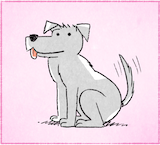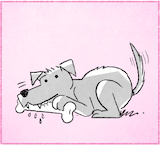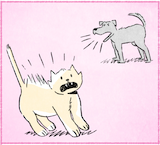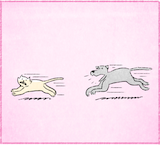




นี้คืออี่หยัง นี้คือหมา
หมามันนั่งอยู่ใส บ่ลู้คือกันจักว่ามันนั่งอยู่ใส จักว่ามันเป็นหมาพุใด จักว่ามันมาแต่ใส
หมามันได้เป็นสัดบ่ เป็นอยู่ หมามันเป็นสัด หมามันเป็นสัดเลี้ยง คนมักเอามันมาเลี้ยงไว้บ้าน เอามาเฝ้าบ้าน
ขนของหมามันสีอี่หยัง ขนของหมามันสีเทา สีเทางามๆ งามหลาย งามบักคักหนึ่ง
หมามันตาฮักบ่ ตาฮักอยู่ หมามันตาฮักหลาย หมามันตาฮักบักคักหนึ่ง
หมามันสั่นหางของมันบ่ สั่นอยู่ หมามันสั่นหางของมันพ้อม
หางของมันญาวๆ ปายหางของมันแหลมๆ
เป็นหญังมันคือสั่นหางของมัน บ่ลู้คือกันจักว่ามันเป็นหญัง มันอาดสิดีใจกะได้ มันกะเลยสั่นหางของมัน
หมามันแลบลิ้นออกมาบ่ แลบลิ้นอยู่ หมามันแลบลิ้นออกมาพ้อม จักมันแลบลิ้นออกมาเฮ็ดหญัง
หมามันแลบลิ้นออกมาหลายบ่ หลายบ่
2
นี้คืออี่หยัง นี้คือกะดูก กะดูกอันบักใหญ่หนึ่ง กะดูกสีขาวจุ่นพู่นอยู่
กะดูกมันแข็งบ่ แข็งอยู่ กะดูกมันแข็งหลาย กะดูกมันแข็งบักคักหนึ่ง
ในล้างกายของคนมีกะดูกบ่ มีอยู่ ในล้างกายของคนมีกะดูก หลายหม้องหลายส่วนในล้างกายของเฮา
แล้วสัดมีกะดูกบ่ มีอยู่ สัดกะมีกะดูกคือกัน สัดกะมีกะดูกหลายหม้องหลายส่วนคือกันกับคน
กะดูกมันหักได้บ่ หักได้อยู่ กะดูกมันหักได้อยู่
ขั้นกะดูกเฮาหัก เฮากะสิเจ็บ ขั้นกะดูกแขนเฮาหัก เฮากะสิเจ็บแขน ขั้นกะดูกขาเฮาหัก เฮากะสิเจ็บขา เพาะสะนั้นแล้วอย่าให้กะดูกหัก
ขั้นกะดูกเฮาหัก เฮากะสิเจ็บ เจ็บหลาย เจ็บบักคักหนึ่ง
3
หมามันกำลังเฮ็ดหญัง หมามันกำลังกินกะดูก หมามันกำลังแห้นกะดูกอยู่
หมามันหิวบ่ บ่ลู้คือกัน ซงคือมันคือสิหิวหลาย มันฟ้าวแห้นกะดูก มันฟ้าวแห้นกินกะดูก
เบิ่งซงแล้วมันคือสิหิวหลาย มันคือสิแซบบักคักหนึ่ง
หมามันมีแข้วบ่ มีอยู่ หมามันมีแข้ว
มันเอาแข้วไว้ถ้าแห้นกะดูก หลือเอาไว้ถ้ากัด หลือเอาไว้ถ้ากินเข้า หลือเอาไว้ถ้ากัดกินแนวกิน
แข้วหมามันแหลมบ่ แหลมอยู่ แข้วหมามันแหลมหลาย แหลมบักคักหนึ่ง แข้วหมามันคมพ้อม คมหลาย คมบักคักคือกัน
แข้วหมามันคม คมหลาย คมหลายกะด้อกะเดี้ย
4
หมามันกำลังเฮ็ดหญัง หมามันกำลังเห่า หมามันเห่าให้แมว หมามันเห่าใส่แมว
แมวมันย้านบ่ ย้านอยู่ แมวมันย้านหลาย แมวมันย้านบักคักหนึ่ง
คือลู้ว่าแมวมันย้าน กะลู้ เพาะว่าเห็นแมวมันขนขิ้นลุก กะเลยลู้ว่าแมวมันย้านหมา คือสิย้านหลาย
เป็นหญังหมาคือเห่าให้แมว บ่ลู้คือกัน ซงคือมันสิบ่มักกัน มันสิบ่ถืกกันกะได้ อาดสิญาดแนวกินกันกะได้
ขนแมวมันสีอี่หยัง ขนแมวมันสีเหลียงแม่นบ่ แม่นอยู่ ขนแมวมันสีเหลียง สีเหลียงอ่ามล่ามอยู่
5
หมามันกำลังเฮ็ดอี่หยัง หมามันกำลังแล่นไล่แมว มันฟ้าวแล่นไล่กันวะสั้น
หมามันแล่นเล็วบ่ เล็วอยู่ หมามันฟ้าวแล่นไล่แมว
แล้วแมวแล่นเล็วบ่ เล็วอยู่ แมวมันแล่นเล็วหลาย เล็วบักคักหนึ่ง ฟ้าวแล่นวะสั้น
แมวกับหมามันแล่นซ้าบ่ บ่ แมวกับหมามันแล่นบ่ซ้า มันฟ้าวแล่นวะสั้น แมวกะฟ้าวแล่นหนีหมา หมากะฟ้าวแล่นไล่แมว
หมามันจับแมวได้บ่ บ่ หมามันจับแมวทันได้ได้ แมวฟ้าวแล่นหนีก่อน
หมามันกัดแมวได้บ่ บ่ หมามันกัดแมวทันได้ได้ เพาะว่าหมามันแล่นบ่ฮอดแมว หมาแล่นบ่ทันแมว
แมวมันย้านหมาบ่ แมวมันย้านหมาอยู่ แมวมันย้านหมาหลาย คือสิย้านหลาย
Link to overview page
Link to dictionary
| Isaan | Pronunciation | Tones | Thai | English/Notes |
|---|---|---|---|---|
| นี้ | ni: | HF | นี้ | 1. this 2. here |
| คือ | khʉ: | HR | คือ | 1. to be, to resemble, like, as 2. why {บักหล้าคือบ่เก็บโต่ะแน่ = [addressing a young boy] Why haven't you cleared the table?} |
| อี่หยัง | i:-yaŋ | H-M | อะไร | 1. what {นี้คืออี่หยัง = What is this?} {มื้อนี้เจ้าเฮ็ดอี่หยัง = What are you doing today?} {กินเข้างายกับอี่หยัง = What did you have for breakfast?} 2. something, anything, (in negations) nothing {บ่ต้องเฮ็ดอี่หยังอีกเลยนอกจากใส่ปุย = [we] don't need to do anything besides adding fertilizer} |
| หมา | ma: | M | หมา | dog |
| มัน | man | HR | มัน | it (also used to refer to people) |
| นั่ง | naŋ | H | นั่ง | to sit |
| อยู่ | yu: | H | อยู่ | 1. to be (located) at 2. yet, still 3. auxiliary indicating continuous or progressive action {ทอดปาอยู่ในกะทะ = (in the process of) frying a fish in the pan} {แม่กำลังเมี้ยนเฮียนอยู่ = mother is cleaning/tidying up the house} |
| ใส | sai | M | (ที่)ไหน | 1. where? {สิไปใส = Where are [you] going?} {มาแต่ใส = Where are [you] coming from?} {กะทะอยู่ใส = Where's the pan?} 2. somewhere, anywhere {ใสกะได้ = anywhere, wherever you like} |
| บ่ | bɔ: | H | ไม่ | 1. no, not 2. question particle, transforming a statement into a question Notes: spelling exception in line with common usage on social media |
| ลู้ | lu: | HF | รู้ | 1. to know 2. to understand Notes: equivalent to ฮู้ |
| คือกัน | khʉ:-gan | HR-M | เหมือนกัน | 1. also, likewise, similarly {ยินดีที่ได้ฮู้จักคือกันคับ = Nice to meet you too!} 2. in negative sentences: either {บ่ลู้คือกัน = I don't know either} {จักคือกัน = I don't know (either)} |
| จัก | jak | M | จัก | 1. answer to a question: [I] don't know, don't know exactly, [I'm] not sure {พุซายคนนี้เขาเถ้าไป่ จัก จักเถ้าหลือบ่เถ้า เบิ่งบ่ค่อยออก = Is this man here already old? I don't know. I can't see clearly whether he's old or not.} {เขาเว้ากันอยู่ใส จักคือกัน = Where are they talking? I don't know either.} 2. exact(ly), what exactly {จักต้มอี่หยังกะบ่ฮู้ = I don't know what (exactly) he is cooking} {บ่ลู้คือกันจักปาอี่หยัง = I don't know either what kind of fish this is} 3. how much/many? {ต้นไม้มีจักต้น = How many trees are there?} {ตอนนี้จักโมงแล้ว = What time is it now?} {มือของเฮานี้สิมีจักนิ้ว = How many fingers do our hands have?} 4. a bit, a little bit {จักหน่อย/จักหน่อยหนึ่ง = a bit, a little bit} |
| ว่า | wa: | H | ว่า | 1. that, as {คำว่า X = the word X} 2. to say |
| เป็น | pen | M | เป็น | 1. to be, to exist 2. to be able to 3. to suffer, sth. happens to 4. เป็นหญัง[...]คือ in initial position: why? {เป็นหญังเขากะคือแปงฟัน = Why is he brushing his teeth?} {เป็นหญังเคี่ยงบินมันคือสิตก = Why is the airplane falling down?} |
| พุใด | phu-dai | H-M | ใคร | 1. who {มีพุใดโทมากะบ่ลู้ = I don't know who has called} {ห้องนอนของพุใด = whose bedroom (is this)? } 2. someone, somebody, anybody, in negative context: nobody {บ่มีพุใดอยู่กับเขาเลย = there's nobody with him} |
| มา | ma: | HR | มา | 1. to come 2. auxiliary expressing action towards the present or focal time {กะคุเฮ็ดมาจากอี่หยัง = What is the bucket made of?} {แล้วเขากะเก็บเงินจากพุนั้นมา = and then she takes the money of that person} |
| แต่ใส | tɛ:-sai | H-M | จากไหน | where from? |
| ได้ | dai | HF | ได้ | 1. can 2. to get, to obtain 3. before verb: indicating past tense 4. บ่ได้ + verb: not |
| สัด | sat | M | สัตว์ | animal |
| สัดเลี้ยง | sat-li:aŋ | M-HF | สัตว์เลี้ยง | 1. pet 2. farm animal |
| คน | khon | HR | คน | person, people |
| มัก | mak | H | ชอบ | to like, to love, to want, to desire |
| เอา | ao | M | เอา | to take, to give {เขากำลังเอาก่องไปซั่ง = he's taking the boxes to weigh them} {หมอกำลังเอายาให้คนป่วยกิน = the doctor is giving medicine to the patient} {เอาไว้ถ้า = is for, is used for, has the purpose of} |
| เลี้ยง | li:aŋ | HF | เลี้ยง | to raise |
| ไว้ | wai | HF | ไว้ | 1. to keep, to put, to place, to retain, to save, to reserve {เขาเอาหัวของเขาไว้ใส = Where does she put her head?} {หมาสิเลี้ยงไว้บ้าน = dogs are kept/raised in the house} {ไก่เลี้ยงไว้ในคอก = chicken are kept/raised in a coop} {หน้ามันบังไว้ = the face is covered/not visible} {เขาเอาโทละสับวางไว้หู = he holds the phone to his ear} 2. for {นาลิกาปุกมีไว้เฮ็ดหญัง = What is an alarm clock for?} {หม้อเอาไว้เฮ็ดแนวกิน = a pot is used to make food} {ก่องเอาไว้เฮ็ดหญัง ก่องเอาไว้ใส่ของ = What is the box for? It's for putting in stuff.} Notes: see also ไว้ถ้า |
| บ้าน | ba:n | HF | บ้าน | 1. house, home 2. village (also used as a prefix before the name of a village) 3. home country, home region {บ้านเฮาเฮ็ดเข้าจั่งใด = How do we plant rice in Isaan/Thailand?} |
| เฝ้า | fao | LF | เฝ้า | to watch, to guard |
| ขน | khon | M | ขน | 1. hair (especially body hair) 2. bristles 3. to carry, to transport {ลดขนของ = transport vehicle} |
| ของ | khɔ:ŋ | M | ของ | of, belonging to |
| สี | si: | M | สี | 1. color 2. colored pencil, crayon |
| เทา | thao | HR | เทา | grey |
| งาม | ŋa:m | HR | สวย | beautiful, handsome, splendid |
| หลาย | la:i | M | เยอะ, มาก | many, much, very |
| บักคักหนึ่ง | bak-khak-nʉŋ | M-H-H | intensifier: very, very much (variant of คัก) | |
| ตาฮัก | ta:-hak | M-H | น่ารัก | cute, lovely |
| สั่น | san | H | สั่น | tail of dog: to wag |
| หาง | ha:ŋ | M | หาง | tail |
| พ้อม | phɔ:m | HF | พร้อม | at the same time, also, too {มีตะเว็นพ้อม = the sun's out, too} {กะทะมีด้ามพ้อม = the pan has also a handle} |
| ญาว | ɲa:o | HR | ยาว | long |
| ปาย | pa:i | M | ปลาย | 1. tip, end, extremity {ปายพูเขา = summit of a mountain} 2. of children: youngest {ลูกสาวคนปาย = youngest daughter} |
| แหลม | lɛ:m | M | แหลม | sharp |
| หญัง | ɲaŋ | M | อะไร, เป็นหญัง = ทำไม | 1. what {เขากำลังเฮ็ดหญัง = What is he doing?} {ธูปเอาไว้เฮ็ดหญัง = What are incense sticks for?} 2. something, anything, (nothing) 3. เป็นหญัง[...]คือ in initial position: why {เป็นหญังเขาคือใส่บักพิกลงไปในกวยเตียว = Why is he putting chili in [his] noodle soup?} {เป็นหญังหน้าต่างมันคือเปิด = Why is the window open?} {เป็นหญังมันคือมีควนไฟ = Why is there smoke?} |
| อาด | a:t | LF | อาจ | 1. might, may, will 2. likely |
| สิ | si | M | จะ | future tense auxiliary {เขากำลังสิตื่น = he's about to wake up} {สิไปตะหลาด = [I'm] going to the market} |
| ดีใจ | di:-jai | M-M | ดีใจ | happy, glad |
| กะ | ga | M | ก็ | 1. then, consequently 2. also |
| เลย | lə:i | HR | เลย | 1. futher on, beyond, past {เข็มน้อยเลยเลขสิบสองไป = the minute hand has passed number twelve} 2. too much 3. at all 4. definitively 5. completely, utterly |
| แลบลิ้น | lɛ:p-lin | HF-HF | แลบลิ้น | to stick out one's tongue |
| ออก | ɔ:k | LF | ออก | 1. to go out, to leave 2. out |
| เฮ็ด | het | H | ทำ | to do, to make |
| กะดูก | ga-du:k | M-LF | กระดูก | bone |
| อัน | an | M | อัน | 1. thing, object 2. general clf. for objects |
| บัก | bak | M | 1. intensifier before adjectives {ปาโตบักใหญ่ = a (very) large fish} 2. prefix in front of fruits and vegetables {บักแตงโม = watermelon} 3. can be used as a reference for a male person of the same or younger age {บักอันนี้ = this lad} |
|
| ใหญ่ | ɲai | H | ใหญ่ | large, big |
| หนึ่ง | nʉŋ | H | หนึ่ง | 1. one 2. after adjective: intensifier {บักคักหนึ่ง = very much} {อันบักใหญ่หนึ่ง = very large}, or attenuates the meaning {กะดาดมันแผ่นน้อยๆ หนึ่ง = the piece of paper is [relatively] small} |
| ขาว | kha:o | M | ขาว | white |
| จุ่นพู่น | jun-phu:n | H-H | color: very white {(สี)ขาวจุ่นพู่น = very white} | |
| แข็ง | khɛŋ | M | แข็ง | hard, strong |
| ใน | nai | HR | ใน | in, within |
| ล้างกาย | la:ŋ-ga:i | HF-M | ร่างกาย | body |
| มี | mi: | HR | มี | 1. to have 2. there is |
| หม้อง | mɔŋ | LF | ที่, แห่ง, บริเวณ | 1. place, area {หลายที่หลายหม้อง = in many places} {หม้องใดหม้องหนึ่ง = some place} 2. clf. for places |
| ส่วน | su:an | H | ส่วน | part, portion |
| เฮา | hao | HR | เรา | 1. personal pronoun: we 2. personal pronoun: I |
| แล้ว | lɛ:o | HF | แล้ว | 1. finished 2. already 3. and then, and next (especially แล้วกะ) 4. auxiliary for past tense |
| กับ | gap | M | กับ | 1. and {ลุงกับป้า = uncle and aunt} {กวยเตียวหมูกับกวยเตียวไก่ = noodle soup with pork and noodle soup with chicken} 2. with, to {ค้ายๆ กับคำว่า ... = similar to the word ...} 3. prefix in front of foods {กับเข้า = side dishes eaten with rice} {เขากินกับกวยเตียว = he's eating noodle soup} |
| หัก | hak | M | หัก | to break, to fracture |
| ขั้น | khan | LF | เมื่อ | when, if |
| เจ็บ | jep | M | เจ็บ | painful, to hurt |
| แขน | khɛ:n | M | แขน | arm |
| ขา | kha: | M | ขา | leg {ขาหน้า = front leg} {ขาหลัง = hind leg} {ส้งขาญาว = long trousers} |
| เพาะสะนั้นแล้ว | phɔ-sa-nan-lɛ:o | H-M-HF-HF | เพราะฉะนั้นแล้ว | therefore, for that reason, consequently Notes: pronunciation: also realized as เพาะฉะนั้น |
| อย่า | ya: | H | อย่า | don't ...! |
| ให้ | hai | LF | ให้ | 1. to give {หมอกำลังเอายาให้คนป่วยกิน = the doctor is giving the patient medicine} 2. for 3. to allow, to be allowed |
| กำลัง | gam-laŋ | M-HR | กำลัง | auxiliary indicating continuous or progressive action |
| กิน | gin | M | กิน | to eat, to consume, to use |
| แห้น | hɛ:n | LF | แทะ | to gnaw, to bite, to nibble {หมามันฟ้าวแห้นกะดูก = the dog hurries to gnaw the bone} |
| หิว | hiu | M | หิว | hungry, to crave (food, water, sleep etc.) {หิวนอน = to be tired} {หิวน้ำ = to be thirsty} {หิวเข้า = to be hungry} |
| ซง | soŋ | HR | ทรง | 1. shape, form 2. as if, like Notes: translation to be confirmed |
| ฟ้าว | fa:o | HF | รีบ | to hurry, to rush |
| เบิ่ง | bəŋ | H | ดู | 1. to look at, to see, to watch {เบิ่งโทละทัด = to watch TV} {เบิ่งหนัง = to watch a movie} 2. to guess {เบิ่งซงแล้ว ... = [I] guess / from what it looks like ...} |
| แซบ | sɛ:p | HF | อร่อย | 1. food: tasty {กวยเตียวมันแซบบ่ = Is the noodle soup tasty?} 2. sleep: well {เป็นตานอนแซบคัก = it looks as if she's sleeping very well} |
| แข้ว | khɛ:o | LF | ฟัน | tooth {หมามันมีแข้ว = the dog has teeth} |
| ไว้ถ้า | wai-tha: | HF-LF | usually in a positive statement or answer: is for, is used for, has the purpose of {กะทะมีไว้ถ้าทอด = a pan is for frying} {น้ำบักนาวมีไว้ถ้าปุงอาหาน = lime juice is used to season food} {ปากกามีไว้ถ้าเขียน = a pen is for writing} {กะเทียมเอาไว้ถ้าเฮ็ดแนวกิน = garlic is used to make food} {ขาเอาไว้ถ้าญ่าง = legs are for walking} {เกิบเอาไว้ถ้าใส่ = shoes are for wearing} Notes: see also ไว้ |
|
| หลือ | lʉ: | M | หรือ | or |
| กัด | gat | M | กัด | to bite |
| เข้า | khao | LF | ข้าว | rice {กินเข้า = to eat} {ปูกเข้า, เฮ็ดเข้า = to grow/plant rice} {เกี่ยวเข้า = to harvest rice} {กับเข้า = courses eaten with rice} |
| แนวกิน | nɛ:o-gin | HR-M | อาหาร | food {เฮ็ดแนวกิน = to prepare food} {ตำบักหุ่งเนี้ยกะสิเป็นแนวกิน = papaya salad is (a kind of) food} |
| คม | khom | HR | คม | 1. sharp {กันไกมันคม = the pair of scissors is sharp} {แข้วหมามันคม = dog's teeth are sharp} {ขวนมันคมบ่ = Is the axe sharp?} 2. blade, sharp edge of a knife etc. {เกี่ยวมีคมคือกันกับมีด = a scythe has a blade like a knife} |
| บักคัก | bak-khak | M-H | intensifier: very, very much (variant of คัก) | |
| กะด้อกะเดี้ย | ga-dɔ:k-ga-di:a | M-HF-M-HF | มากมาย, มากเกินไป | intensifier: very, very much |
| เห่า | hao | H | เห่า | dog: to bark {หมามันเห่าใส่แมว = the dog is barking at the cat} |
| แมว | mɛ:o | HR | แมว | cat |
| ใส่ | sai | H | ใส่ | 1. to put something in/on {เขาใส่บักพิกในกวยเตียวหลาย = he's putting a lot of chili in his noodle soup} {เขาบีบยาสีฟันใส่แปงสีฟัน = he squeezes toothpaste on the toothbrush} {ก่องเอาไว้ใส่ของ = boxes are there to put stuff in} 2. to wear (clothes) {เขาใส่เสี้ยแขนญาว = he's wearing a long-sleeve} 3. directed at {เอิ้นใส่กัน = to call each other/to say to each other} {หมามันเห่าใส่แมว = the dog barks at the cat} {ล้องเพงใส่ไม = to sing into the microphone} {เขากำลังซี้มือไปใส่พุซาย = she's pointing at the man} |
| ย้าน | ya:n | HF | กลัว | to be afraid |
| เพาะว่า | phɔ-wa: | H-H | เพราะว่า | because |
| เห็น | hen | M | เห็น | to see |
| ขิ้น | khin | LF | to rise, to go up | |
| ลุก | luk | H | ลุก | 1. to be in flames, to burn 2. to rise, to get up, to stand up |
| กัน | gan | M | กัน | mutual, each other, with another, together {เขากำลังนั่งเว้ากัน = they're sitting and talking} {เขาสองคนฮักกัน = they love each other} {ปาสองโตนี้ ใหญ่ห่างกันหลายบ่ = These two fish here, are they very different in size (from each other)?} {ต่างกัน = to be different (from each other)} {ก่องอันไหนหนักกว่ากัน = Which box is heavier (than the other(s))?} |
| ถืกกัน | thʉ:k-gan | LF-M | ถูกกัน | to get along {มันสิบ่ถืกกันกะได้ = maybe they're not getting along} |
| ญาด | ɲa:t | HF | แย่ง | to snatch, to steal, to take by force |
| เหลียง | li:aŋ | M | เหลือง | yellow |
| แม่นบ่ | mɛ:n-bɔ: | H-H | ใช่ไหม | question particle: ..., right? ..., isn't it? ..., don't you? etc. {เจ้าได้เห็นสิ่งนั้นแม่นบ่ = You've seen that, haven't you?} {ฝนกำลังตกแม่นบ่ = It's raining, isn't it?} {นี้คือกะคุแม่นบ่ = This is a bucket, isn't it?} |
| แม่น | mɛ:n | H | ใช่ | 1. yes 2. affirmative particle |
| อ่ามล่าม | a:m-la:m | H-H | color: very yellow {สีเหลียงอ่ามล่าม = very yellow} | |
| แล่น | lɛ:n | H | วิ่ง | to run {ไก่กำลังแล่น = the chicken is running} {เด็กน้อยกะแล่นเหล้น = the kids are running around} {ลดไฟกำลังแล่น มันแล่นอยู่เทิงลาง = the train is running, it's running on rails} {เลียแล่นไปแล่นมา = ships are going back and forth} |
| ไล่ | lai | H | ไล่ | to chase |
| วะสั้น | wa-san | H-LF | มากๆ, เร็วๆ | emphasizes or adds a sense of urgency Notes: translation to be verified |
| เล็ว | leo | HR | เร็ว | fast, quick |
| ซ้า | sa: | HF | ช้า | 1. slow 2. late, delayed |
| หนี | ni: | M | หนี | to flee, to escape, to run away |
| จับ | jap | M | จับ | 1. to grasp, to hold {เขาจับมือกัน = they're holding hands} {เขายืนจับไอติมอยู่ = she's standing, holding an ice cream} 2. to catch, to arrest {จับพุล้าย = to arrest a criminal} |
| ทันได้ | than-dai | HR-HF | ยังไม่ได้ | not, not yet {มันทันได้เกิดขึ้น = it hasn't happened yet} {หัวหนึ่งทันได้ปาด = one [onion] hasn't been cut yet} {หมามันจับแมวทันได้ได้ = the dog hasn't been able yet to catch the cat} {เขากะทันได้เถ้า = he's not yet old} Notes: equivalent to บ่ทันได้ |
| ก่อน | gɔ:n | H | ก่อน | 1. before 2. first, first of all |
| ฮอด | hɔ:t | HF | ถึง | 1. to arrive, to attain {ฮอดจุดหมายปายทาง = (airplane, train etc.) to arrive at one's destination} {มันทันได้ฮอดหกโมงอยู่ = it's not yet 6 o'clock} 2. to, at {ผมญาวฮอดบ่าไหล่เอาโลด = long hair down to the shoulders} 3. about {บ่ได้เว้าฮอด = [I] haven't talked about [this]} {คนที่เฮาเว้าฮอดวั่งหั้นหละ = the person we've just talked about} |
| ทัน | than | HR | ทัน | 1. to catch up with, to reach 2. to be on time |